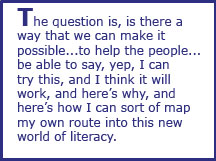KY: Again, I think sometimes one can be the right person at the right time, [Laughs] or you can be the right person at the wrong time, or you can be the wrong person at the right time! [Laughs again] One hopes for the first of those options. That's my way of saying too, that context actually matters. Nationally, there are several groups interested in multimodal and multimedia literacy. That's partly why I mentioned the National Assessment of Educational Progress. I mean, that's one group that is actually pretty important.
|
It is also the case that the NCTE Executive Committee has adopted a position statement on multimodal literacy that will be made available probably within the next month. We’re in serious conversation with a number of partners around the country to create what you might call a “national project” around this effort. |
When I ran for office, I said that I had three planks. The first is more advocacy. The NCTE Washington D.C. office was absolutely critical. Place matters. That's where a lot of partnerships get formed; that's where you talk to people on the Hill. We really need to do more of both of these things. Next, we needed to find as many good partners as we could, and that's really tough. We have sponsorships, as most conferences do. Bedford, for instance, makes a big contribution to TYCA. Thomson, on the CCCC's side, has made a real commitment to the Professional Equity Project that funds adjuncts coming to CCCCs. Scholastic hosts a big dinner at NCTE every year. We have guidelines that govern relationships between NCTE and for-profits, and now we're going to have guidelines that will govern our relationships with non-profits as well. On the presidential team, we're thinking long and hard about how some of these partnerships might work.
Finally, there is the matter of professional development. How does NCTE position itself with regard to this issue? That's a fundamental question because teachers in every context—elementary school, middle school, high school, college—will tell you that they really want to do some of what we have been discussing, but they don't really know how. When most people try something new, they want to feel like they've got a shot at succeeding. If that is so, and if NCTE includes people who are very good at this, then how do we bring all these individuals together in a way that benefits students and teachers?
There's no other organization in the country, none, that has this particular way of seeing the classroom, this particular skill set, these particular smarts. The question then becomes “Is there a way that we can make it possible for those people to help the people who want to know how to map their own route into this new world of literacy?” Frankly, we're going to spend the next year at NCTE trying to figure out this question. A year from today we ought to be able to tell how we can make this happen, the principles governing that activity, and some of the partners that can help us do this. Isn't that exciting?

